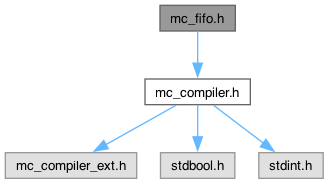Detailed Description
This FIFO implementation is using inline functions and is optimized for embedded implementation. The FIFO can store data elements of arbitrary size.
 Include dependency graph for mc_fifo.h:
Include dependency graph for mc_fifo.h:Data Structures | |
| struct | McFifoCtrl_s |
Functions | |
| void * | McFifoDataInPtr (McFifoCtrl_ts *ptsFifoV) |
| void * | McFifoDataOutPtr (McFifoCtrl_ts *ptsFifoV) |
| uint32_t | McFifoFree (McFifoCtrl_ts *ptsFifoV) |
| void | McFifoIncIn (McFifoCtrl_ts *ptsFifoV) |
| void | McFifoIncOut (McFifoCtrl_ts *ptsFifoV) |
| void | McFifoInit (McFifoCtrl_ts *ptsFifoV, void *pvdDataV, uint32_t ulDataSizeV, uint32_t ulFifoSizeV) |
| bool_t | McFifoIsEmpty (McFifoCtrl_ts *ptsFifoV) |
| bool_t | McFifoIsFull (McFifoCtrl_ts *ptsFifoV) |
| uint32_t | McFifoPending (McFifoCtrl_ts *ptsFifoV) |
Function Documentation
◆ McFifoDataInPtr()
| void * McFifoDataInPtr | ( | McFifoCtrl_ts * | ptsFifoV | ) |
- Parameters
-
[in] ptsFifoV Pointer to FIFO control structure
- Returns
- Pointer to next free data element inside FIFO for push operation
- See also
- McFifoDataOutPtr()
The function returns a pointer to the next free data element inside the FIFO defined by ptsFifoV for push operation.
◆ McFifoDataOutPtr()
| void * McFifoDataOutPtr | ( | McFifoCtrl_ts * | ptsFifoV | ) |
- Parameters
-
[in] ptsFifoV Pointer to FIFO control structure
- Returns
- Pointer to first data element inside FIFO for pop operation
- See also
- McFifoDataInPtr()
The function returns a pointer to the first data element inside the FIFO defined by ptsFifoV for pop operation.
◆ McFifoFree()
| uint32_t McFifoFree | ( | McFifoCtrl_ts * | ptsFifoV | ) |
- Parameters
-
[in] ptsFifoV Pointer to FIFO control structure
This function returns the number of data elements which can be stored inside the FIFO defined by ptsFifoV.
◆ McFifoIncIn()
| void McFifoIncIn | ( | McFifoCtrl_ts * | ptsFifoV | ) |
- Parameters
-
[in] ptsFifoV Pointer to FIFO control structure
This function increments the pointer for the input data element (push operation) inside the FIFO defined by ptsFifoV. This operation is done after McFifoDataInPtr() has been called.
◆ McFifoIncOut()
| void McFifoIncOut | ( | McFifoCtrl_ts * | ptsFifoV | ) |
- Parameters
-
[in] ptsFifoV Pointer to FIFO control structure
This function decrements the pointer for the output data element (pop operation) inside the FIFO defined by ptsFifoV. This operation is done after McFifoDataOutPtr() has been called.
◆ McFifoInit()
| void McFifoInit | ( | McFifoCtrl_ts * | ptsFifoV, |
| void * | pvdDataV, | ||
| uint32_t | ulDataSizeV, | ||
| uint32_t | ulFifoSizeV ) |
- Parameters
-
[in] ptsFifoV Pointer to FIFO control structure [in] pvdDataV Pointer to array of data elements [in] ulDataSizeV Size of one single data element in bytes [in] ulFifoSizeV Maximum number of data elements in FIFO
This function initialises a FIFO defined by the control structure ptsFifoV with a maximum size of ulFifoSizeV data elements. The application must guarantee that the pointer pvdDataV points to an array of ulFifoSizeV data elements. The size in bytes of the arbitrary data element is defined by ulDataSizeV.
Here is an example for initialisation of a FIFO:
◆ McFifoIsEmpty()
| bool_t McFifoIsEmpty | ( | McFifoCtrl_ts * | ptsFifoV | ) |
- Parameters
-
[in] ptsFifoV Pointer to FIFO control structure
- Returns
- true if FIFO is empty, otherwise false
- See also
- CpFifoIsFull()
The function returns true if the FIFO is empty, otherwise it will return false.
◆ McFifoIsFull()
| bool_t McFifoIsFull | ( | McFifoCtrl_ts * | ptsFifoV | ) |
- Parameters
-
[in] ptsFifoV Pointer to FIFO control structure
- Returns
- true if FIFO is empty, otherwise false
- See also
- CpFifoIsFull()
The function returns true if the FIFO is full, otherwise it will return false.
◆ McFifoPending()
| uint32_t McFifoPending | ( | McFifoCtrl_ts * | ptsFifoV | ) |
- Parameters
-
[in] ptsFifoV Pointer to FIFO control structure
- Returns
- Number of data elements inside FIFO
The function returns the number of data elements which are stored inside the FIFO defined by ptsFifoV.
